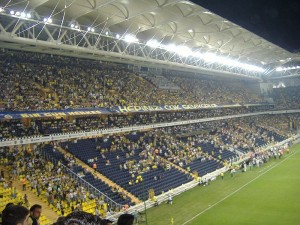I’m often the first to cringe when any element of patriotism surrounds rhetoric on anything related to Australia.
But the weekend’s major sporting event in the country which is the birthplace of my parents has left me grateful for what we have here.
On Saturday, Turkish soccer’s arch rivals Fenerbahce and Galatasaray faced-off in what was dubbed the ‘super final derby’.

Like most European countries, the championship in Turkey is awarded to the team which finishes on the top of the ladder; it’s a title race, after all.
But this year, the Turkish Football Federation (TFF) decided on a new format nearing the end of the season; that the top-four teams – Galatasary, Fenerbahce, Besiktas and Trabzonspor – would compete in a four-way title play off.
And so all teams’ final scores were halved to make the play-off more competitive. Galatasaray who had finished 9 points in front, was suddenly only 4.5 points (rounded up to 5) ahead.
The reasoning the TFF gave was to put to bed any talks of match-fixing which had haunted some of Turkey’s tops teams for most of the previous season.
Some 22 league matches in the 2010-2011 season were said to have been targeted by match-fixers, and top-side Fenerbahce was banned from the UEFA champions league because of its involvement in the scandal.
What has been rumoured as a culture within Turkish soccer had become close to being proved as factual, with the announcement of an investigation into the matter.
But in extraordinary circumstances, all teams have since been cleared of all allegations.
I say extraordinary because on the eve of the final decision from the investigation, the TFF decided to introduce a ‘new system’ in dealing with alleged match-fixing.
The TFF said the current (now old) rules, which punish match-fixing with relegation, were too harsh for attempts to rig games.
This decision was unveiled in the middle of the week, at around 2am on one night, way after the next day’s newspapers had been sent to print.
But the discussion around match-fixing was muted this weekend, as the country held its breath to see the title play-off between the two Istanbul rivals.
It was a tense game, to say the least, resulting in a goalless finish. The game was played at Fenerbahce’s home stadium in Kadikoy, which was filled with a capacity of 52,000 Fenerbahce fans. The draw meant Galatasaray, which was half a point in front of Fenerbahce, was crowned this year’s champions.
And yet with the final whistle began the actual show.
Fenerbahce fans ran on to the ground. Players started pushing and shoving officials. Police used their shields to protect the Galatasaray players who were celebrating on the pitch. Flares were lit, and police were forced to use pepper spray as the players rushed to the changing rooms.
The TFF was then faced with the dilemma of how the championship cup was to be presented to the Galatasaray players among the chaos. It was clear the Fenerbahce fans were not going to let this happen on the pitch.
The quickly-devised plan B was to hand the trophy to the winning side in the changing rooms. Galatasaray officials refused to accept this agreement. And rightfully so, in my opinion.
Meanwhile, fans continued to throw plastic chairs and flares on the pitch and completely dismantled their team’s stadium.
The violence flowed to the streets. Fans pelted police vehicles with stones, overturned rubbish bins, smashed shop windows and left Kadikoy’s surroundings littered with debris.
Unconfirmed reports that a 12-year-old Fenerbahce fan had been stabbed went viral on Twitter. Police then reported that a 29-year-old Galatasaray fan was also stabbed.
On and on it went. To me, championship glory was overshadowed by what can only be described as appalling human behaviour which is not at all uncommon for those living in that part of the world.
Yet these events take away from the beauty of one of the world’s oldest games.
The violence that erupted was expected; Turkey, like many European countries often has to deal with this in the aftermath of derbies.
Who is to blame? The authorities? Perhaps. It’s hard to say.
And what about the culture instilled in the fans from a very young age?
A friend of mine, who shall remain nameless, wrote on her Facebook after the game: ‘Up yours Galatasaray and your stupid fans… U didnt deserve to win and u deserve to hav ur faces smashed in and bled. Grrr so f**king angry…. who do u think use r?’
Words, behaviour and actions which are often frowned upon at many sporting events in Australia are common practice in some cultures.
I long for the day where I can go to a football game in Europe without the fear of possibly being hurt. Or the day that, just like at a Carlton-Collingwood game at the ‘G, fans can disperse from the stadium in peace and walk side-by-side towards the train station.
Though not without its flaws, we’re without a doubt a model of success when it comes to sport.
Watching the behaviour and sportsmanship of the Auskick kids at half-time at the footy reveals so much about the culture we breed.
This differs immensely from even street soccer played by kids in any European city.
Call me patriotic, but I’d rather a culture where sport is left on the field and taken at face-value for what it is.
Because those who claim they bleed the colours of their teams can only breed hatred.
Erdem Koç teaches journalism at La Trobe University, and is happy to disclose that he’s a Galatasaray fan. You can follow him on Twitter: @erdemkoc






